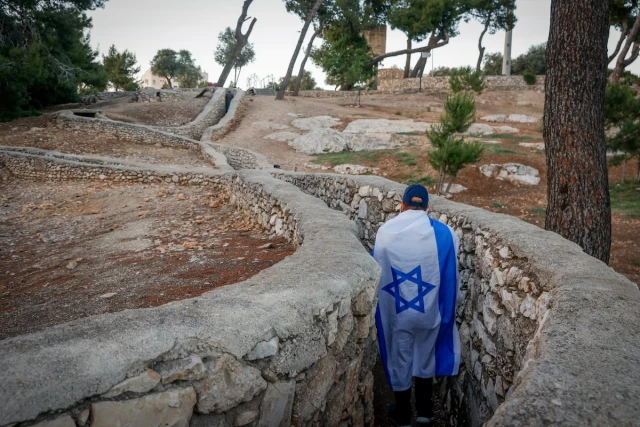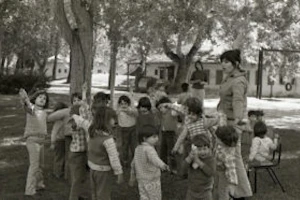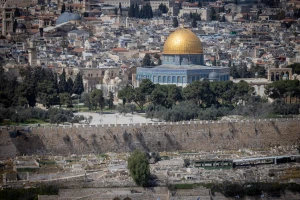Ammunition Hill in Jerusalem: The place where prophecy came to pass

Ammunition Hill might look like a tranquil spot today but it was a key turning point in the Six Day War of 1967, leading to Israel’s miraculous victory against five Arab armies. What's even more extraordinary is that Jesus, Himself, prophesied that this victory would one day come.
The hill lies just north of Jerusalem, on the road between Ramallah and Mount Scopus. It was the site of a munitions storage facility during the time of the British Mandate, with a police academy built on the slopes below. However, the strategic spot, with its 360-degree lookout over Jerusalem, was commandeered by Jordan, when Arab armies first attacked the nascent Jewish state in 1948.
The Jordanians fortified the site with trenches and bunkers, and from 1948 until 1967 it was used as a military post, at the edge of the armistice line between Jordan and Israel. Jordanian forces controlled the road connecting Ramallah to Mount Scopus where Hebrew University and Hadassah Hospital are located, cutting off access to the Israeli enclave. However, all that was to change just 19 years later, when Israel won the battle no one dreamed was possible. The taking of Ammunition Hill was essentially what led to the reunification of Jerusalem, and the holy city once again being in Jewish hands for the first time in 2,000 years.
In his Gospel, Luke records that Jesus prophesied concerning that moment. “Jerusalem will be trampled underfoot by the Gentiles,” He warned, “until the times of the Gentiles are fulfilled” (Luke 21:24). His listeners likely had no idea how many years would pass before Jerusalem would once again become Jewish.
After Jesus ascended, Jerusalem became part of Syria Palestina – as the Romans called it – and control of the area was passed from pillar to post as various empires rose and fell. After the Byzantine era of the Romans came the Arab conquests and then the Crusaders, then the Ayyubids from Iraq and the Mamluks from Egypt, and later, the Ottomans from Turkey and the Mandate Era under the British.
Gentile powers had ruled over Jerusalem for millennia, but in 1967, when the 55th Paratroopers Brigade – specifically the 66th Battalion – were tasked with capturing Ammunition Hill from Jordan, everything changed. But what a cost. It was on that hill that 36 Israeli soldiers and 71 Jordanian soldiers lost their lives.
ALL ISRAEL NEWS correspondent, Oriel Moran, shared her impressions in her report on the historic site, and the maze of fortified trenches.
“As I walk through these preserved trenches, I'm struck by how narrow they are, barely the width of a man's shoulders,” she said referring to the critical event that took place on June 6, 1967.
“The fighting here began at 2:30 in the morning and lasted for four grueling hours. Israeli paratroopers used Bangalore torpedoes to clear away barbed wire and fought their way through these trenches, often [engaging] in hand-to-hand combat,” she explained.
After a bloody battle, Israeli paratroopers took the position, which eventually led to the opening of the road to Mount Scopus and ultimately to the Old City.
“The next day on June 7th, the same paratroopers who fought here entered the Old City through the lion's gate.” It wasn’t long after that when Colonel (later Major General) Mordechai Gur uttered the historic words, “The Temple Mount is in our hands!”
It would likely never have happened if the surrounding armies had not mobilized for the attack. In the weeks leading up to the conflict, alarm grew as Egypt, Jordan and Syria formed a military alliance and positioned aircraft against the Jewish state.
It became clear that if Israel didn’t act, it wouldn’t survive. They were vastly outnumbered but had very few options. Many in Israel had resigned themselves to defeat, with parks being assigned as graveyards by rabbis in anticipation of mass slaughter. Yet, against crippling odds and thanks to numerous documented miracles, Israel survived.
Israel pre-emptively struck the Egyptian Air Force, which was mobilizing for attack, and pleaded with Jordan's King Hussein not to join the fighting. But when Jordan began bombing West Jerusalem, Israel set its sights on Ammunition Hill. The events that followed changed the course of history.
Today, a museum at Ammunition Hill commemorates the liberation and unification of Jerusalem, where 182 soldiers from the Jerusalem, Armored Harel, and Paratrooper Divisions, as well as the Air Force, lost their lives. It has also become a site for significant events, such as a joint memorial service in 2012 that brought together 20 veteran Jordanian and Israeli soldiers who had fought in 1967 – 18 years after the peace agreement with Jordan.
The meeting was arranged by the Israeli Economic Cooperation Foundation (ECF) and Jordan’s Amman Center for Peace and Development (ACPD).
“We once looked at each other through the barrels of guns,” one man told the Times of Israel. “Now we shook hands and exchanged war stories.”
Colonel (res.) Yossi Langotsky, who served as commanding officer of the Jerusalem Reconnaissance Unit reflected on the service saying, “The whole event was deeply moving. It highlighted the absurdity of war. Humanity hasn’t yet found the way to avoid war, but when you meet the soldier who fought against you, you realize he’s just a person and you ask yourself, “What were we doing killing each other?””
The names of the deceased were read aloud, while Haim Gouri, who served as company commander, read his famous poem “Here our Bodies Lie,” translated into Arabic.
“The entire visit took place in an atmosphere of mutual respect, honor and reconciliation,” said Nachum Baruchi, who served as a mechanized infantry company commander in the Harel armored brigade.
He added that he had always respected the Jordanian army. “Ever since I was a child I considered the Jordanian army professional and fair in the way they treated our prisoners of war,” he said. “They were not savages.”
Moran concluded, “This powerful moment of reconciliation reminds us that while we must remember the sacrifices of war, we also pray for the peace of Jerusalem.”

Jo Elizabeth has a great interest in politics and cultural developments, studying Social Policy for her first degree and gaining a Masters in Jewish Philosophy from Haifa University, but she loves to write about the Bible and its primary subject, the God of Israel. As a writer, Jo spends her time between the UK and Jerusalem, Israel.
You might also like to read this:










